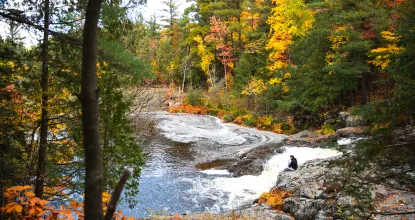Campus Nursery
The Campus Nursery is a collaboration between NMU Grounds & Facilities & SHINE (Sustainability Hub for Innovation & Environment). The idea is an adaptation of multiple student submitted Green Fund projects. Those individuals are: Annika Borovich, Jacob Fewkes, Samantha Gardener, Isabelle Honkomp, Madelyn Mays, Autumn Post, Autumn Post, Lainey Trubiroha, and Marley Wolff. Together, we are developing a plant nursery for growing native, nativar and cultivated native species to use in future landscaping projects on campus.
The Nursery is located behind NMU's Police Department, exactly where NMU grew a tree nursery decades ago. Today there is a 150-foot x 75-foot parcel to grow plant native trees, shrubs, and bushes. A native plant intern will help to nurture the plants until they are large enough to be used in campus landscaping projects.
Campus Nursery Grand Opening
As apart of NMU's 125th anniversary celebration, SHINE and NMU Facilities hosted a grand opening ceremony for the campus nursery on October 1, 2024. Watch to learn more about the event and the campus nursery.
Why Native Species?
Native plants are crucial to our local ecosystem; they increase biodiversity and ecological function by supporting native pollinators and insects. Native species also require less landscaping maintenance like watering. Since these plants fit our region’s specific soil conditions, they also improve soil health by preventing erosion and enhancing water retention. By planting native species, we can ensure the resilience and health of our campus environment for generations to come.
Native Species at the Campus Nursery

Bearberry
Arctostaphylos Uva-ursi
Aggressive spread via rizhomes; does well in sandy soil where others can’t thrive.

Common Ninebark
Physocarpus Opulifolius
Naturally found along streambanks, good drought tolerance once established.

Common Snowberry
Symphoricarpos Albus
Native to Marquette County and Michigan; spreads to form thickets.

New Jersey Tea
Ceanothus Americanus
Shrub with glossy leaves and bright white flowers that nourish many species of butterflies.

Partridgeberry
Mitchella Repens
Does well in rich, medium moisture soil at shady sights. Forms a short, spreading ground cover.

Pin Cherry
Prunus Pensylvanica
Likes woodland edges and provides good bird habitat.

Red Chokeberry
Aronia Arbutifolia
Deciduous shrub in the rose family, with white flowers and bright red berries in the fall.

Red-Osier Dogwood
Cornussericea
Deciduous shrub with dark red branches and twigs, with berries that local wildlife love.

Red Pine
Pinus Resinosa
Dominant species in pre-settlement vegetation; needs large area to reach mature size.

Smooth Rose
Rosa Blanda
Spreads rhizomatously, best for mass planting. Mostly thornless.

Thimbleberry
Rubus Parviflorus
Multiple thimbleberry varieties are native to Marquette County and readily available.

Witch Hazel
Hamamelis Virginiana
Yellow flowers are often the last thing to bloom for the season, sometimes into the winter.
